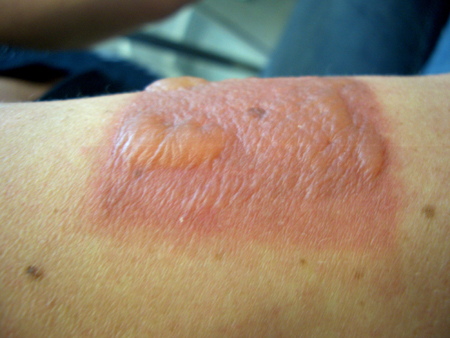Investigations
Investigations to consider
phototesting and photoprovocation
Test
Rarely required. Ordered only when diagnosis is in doubt. Testing is done with UV-A and UV-B.[1] A combined photoprovocation test may be necessary in individual patients where the history suggests different action spectra or where UV-A and UV-B photoprovocation alone yield negative results.
When initial phototests are negative (especially for darker skin types), higher, repeated ultraviolet radiation doses, especially for UV-A, may be required. [Figure caption and citation for the preceding image starts]: Pronounced bullous PLE after photoprovocation (3 x 100 J/cm^2 UV-A)Image provided by Dr Hadshiew; used with permission [Citation ends].
Result
normal minimal erythemal doses (MED), normal pigmentation, provocation shows typical morphological changes (papules and vesicles in the provocation area) consistent with PLE, after repetitive provocation with 60 J/cm² UV-A
skin biopsy
Test
PLE is a clinical diagnosis and biopsy is rarely necessary except to exclude more severe conditions such as systemic lupus erythematosus.
Result
perivascular lymphocytic infiltration in the upper dermis; sub-epidermal oedema; epidermal changes with vacuolar degeneration of the base membrane
Use of this content is subject to our disclaimer